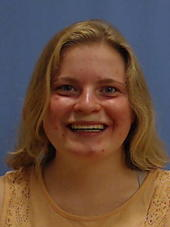Celebration of Scholars
PECAAN PHAGE PIE: The Sequencing and Annotation of the Bacteriophage Velene’s Genome
 Name:
Asher Boucher
Name:
Asher Boucher
Major: Biology, Neuroscience
Hometown: Burlington, WI
Faculty Sponsor: Deborah Tobiason
Other Sponsors:
Type of research: Course project
Funding: Howard Hughes Medical Institute
 Name:
Ashlynne Edwards
Name:
Ashlynne Edwards
Major: Neuroscience
Hometown: Kenosha, WI
Faculty Sponsor: Deborah Tobiason
Other Sponsors:
Type of research: Course project
Funding: Howard Hughes Medical Institute
 Name:
Mason Fanelle
Name:
Mason Fanelle
Major: Biology
Hometown: Kenosha, WI
Faculty Sponsor: Deborah Tobiason
Other Sponsors:
Type of research: Course project
Funding: Howard Hughes Medical Institute
 Name:
Letitia Siers
Name:
Letitia Siers
Major: Neuroscience
Hometown: Duluth, MN
Faculty Sponsor: Deborah Tobiason
Other Sponsors:
Type of research: Course project
Funding: Howard Hughes Medical Institute
Abstract
Bacteriophages are viruses that infect bacterial hosts. The bacterial host Microbacterium foliorum was used as the host bacteria for the phage studied here. In the fall of 2018, phages were isolated at Carthage, purified, characterized, and 3 out of 58 phages were chosen for DNA analysis including Velene. Velene is a lytic, siphoviridae bacteriophage from cluster EA1. One of the goals of this project was to analyze the sequence of Velene’s genome. To this end, a combination of comparative tools and bioinformatic algorithms were used to determine the location, function, and features in the bacteriophage Velene. Annotation for the phage DNA sequence used comparative tools such as HHPRED, BLAST, and Phamerator to compare the similarity of this phage to other phages to identify similar functions and locations of genes. These comparisons expand on previous work performed by others. In addition to determining how Velene is related to other phages, the sequence was analyzed using gene prediction algorithms GeneMark and Glimmer which predict protein-encoding genes. The genome sequence and annotation of the bacteriophage will be combined and submitted to GenBank, which may become the basis of future experiments in the field of phage biology.Submit date: March 14, 2019, 11:21 a.m.
